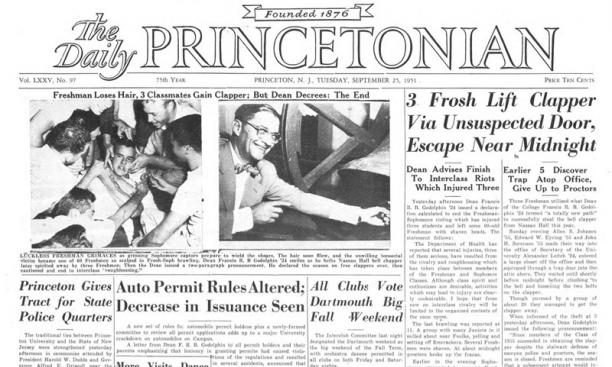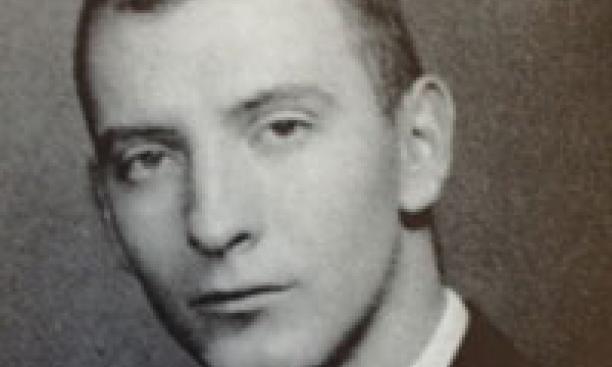
Stealing the clapper from the bell on Nassau Hall at midnight Sunday of freshman week was a Princeton tradition until the early 1990s when the administration, concerned about safety, upgraded an electronic toller and permanently removed the clapper. Freshmen stole the clapper so it would not ring to start classes the next day. Sophomores tried to prevent this, and rival groups of freshmen tried to seize the clapper.
Inspiration for writing this account came from reading James Axtell’s excellent history, The Making of Princeton University. He included several paragraphs about stealing the clapper, noting that the family business that made the replacement bell for Nassau Hall in 1857 “received more orders for clappers for the Princeton bell than for any other bell in the firm’s history.” I am happy to have contributed to this firm’s workload.

Clapper stealing was a topic of conversation during my freshman week in September 1951. My grandfather, William H. Johnson 1888, lived in Princeton. When I talked with him about the clapper, he said he had heard there was access to the attic of Nassau Hall from the ceiling of an upper-floor office. That made sense to me, so on Friday afternoon before “clapper night” I visited Nassau Hall and surreptitiously unlatched a couple of windows in offices in the left wing of the building. That night I was able to get in one of the windows and explore the rooms on the top floor. Lo and behold, in a long narrow closet I found a hatch in the ceiling. Climbing up dusty bookshelves, I made sure the hatch would open and give access to the attic.
My effort on Sunday, clapper night, was not the first of the day. That afternoon, according to The Daily Princetonian, a band of five freshmen sawed the hasp off a metal trap door in the third-floor ceiling in another part of the building. They then barricaded themselves in the attic with the intention of sitting tight until midnight. But two hours of yelling, pounding on the trap door with a Stillson wrench, and waving to friends below from the roof finally attracted the attention of the proctors, who ordered them down. Though firmly ensconced, they obeyed. Proctors then locked the metal trap using another hasp. I had no contact with this earlier group of five.
On clapper night, wearing my 1955 dink (a round, black hat freshmen were required to wear during the week), I approached Nassau Hall toward midnight. Finding two freshmen with big pipe wrenches, Ed Eyring and John Sorenson (both now deceased,) I asked them to join me. Together, we found the window still unlatched and sneaked in. We were easily able to get up through the hatch and attic to the bell tower. Technically we were supposed to wait until after midnight, but hearing an intrepid mountaineer climbing the ivy or a ladder on the side of the building, we decided to loosen the bolt.

I held the clapper while Ed and John unscrewed the large nut and pulled the bolt holding the clapper inside the large bell. The climber had not yet come over the rooftop by midnight, so we retreated into the attic, down into the closet, and out the window. Before climbing down we had agreed to split up when we got out the window, each going in a different direction. Holding the clapper under my jacket – not an easy job because the clapper was almost two feet long and weighed about 20 pounds – I started walking quickly toward East Pyne Hall. Then, from a group of freshmen near the cannon on the green behind Nassau Hall, I heard a shout: “Hey, he’s got the clapper!”
I ran through the East Pyne arches, past the front of Firestone Library, and was far enough ahead to ditch the clapper under a bush on the side of the library. Then I doubled back and joined the pursuing group, headed by Gary Nash. Someone said, “Better look in the bushes.” I went to my bush, pushed more leaves over the clapper, and yelled, “Nope – nothing here!” Reaching Washington Road without success, the group dispersed. Later that night I returned to the bush, hid the clapper under my raincoat, and returned successfully to my room on the top floor of Lockhart. The next day Ed, John, and I posed with the clapper for a photo and article in The Daily Princetonian.
The front-page article in the Prince on Sept. 25, reporting on our successful effort, quoted Dean of the College Francis R.B. Godolphin ’24 as saying, “Three freshmen utilized a totally new path to successfully steal the clapper this year.” He then declared the “clapper season” officially closed.
Unfortunately, during the summer between my junior and senior years, the clapper was taken from my room in Little Hall. Earlier, however, talking with a proctor about the clapper, I learned there was a supply of clappers stored in the basement of McCosh Hall. So I went into the basement one afternoon and unlatched a couple of windows.
That night, and the next, I squeezed through a small window, searched the basement rooms, and finally found a large chest full of clappers. I took four, one each for Ed, John, and myself, and one that I left on the front doorstep of the dean of the college. To this day, my clapper is standing in a corner next to our fireplace, reminding me each time I look at it of an exciting freshman week at Princeton in 1951.
After a career in international human resources including 7 years in Tripoli, Libya and 2 years in Geneva, Switzerland, Allen Johnson '55 retired with his wife, Sally, to the coast of Maine where they keep busy sailing, kayaking, and making sure the tide comes in and out on time.
